When Kenyan native Fato visits New Freedom Park at 13th Avenue and Xenia Street in Denver, she’s surrounded by reminders of others who have traveled thousands of miles to make Colorado their home — and not just because the two-acre space was designed by immigrants and refugees.
The park is also the site of weekly food distribution tables set up by Kaizen Food Share, which offers brightly colored, “culturally responsive” produce that reflects the backgrounds of people who gather to receive it.
“This helps a lot, especially if SNAP has run out for the month or you haven’t gotten your paycheck,” said Fato, whose last name has been withheld in the Food Bank of the Rockies campaign in which she’s featured. “Especially if you have kids — they always want to eat!”
Kaizen is a Hunger Relief partner of Food Bank of the Rockies, one of the nonprofit recipients of financial support from The Denver Post Foundation’s Season to Share campaign. The majority-refugee population in which Fato lives depends on Food Bank of the Rockies and its partners to provide this service that’s foundational to every other aspect of her life.

With sharply increased food insecurity across diverse communities, Food Bank of the Rockies is also depending on public support to meet its own needs. Over the last year, Food Bank employees have seen the overall costs of living and food-inflation restrict access to not only affordable, healthy meals for families, but Food Bank’s ability to acquire it.

“More people are having to make a choice between putting food on the table and paying other essential bills,” said Erin Pulling, president and CEO of Food Bank of the Rockies. “We’ve seen a huge increase in the number of people we’re serving over the last 12 months.”
A few months ago, expanded emergency benefits from SNAP, or food stamps, ran out of their COVID-19 phase, combining with a downturn in the amount of USDA or government-commodity food Food Bank receives. Food Bank purchases and distributes 15 truckloads of food every week, which costs about $1.5 million per month. With the recently closed, COVID-era benefits in place, it was closer to $300,000 or $400,000 per month, Pullman said.
“It’s tough to sustain this level of food purchasing, so we’re really just depending on the generosity of the public,” she said.
As noted, the increases come during a time when Food Bank of the Rockies and their nonprofit peers are ramping up efforts to provide food that reflects the 20 different languages spoken each week at New Freedom Park, for example. That includes not only buying the right produce, but training workers and volunteers to work with the language and cultures of the people receiving it.
“It’s a strategy that really just comes down to more community engagement,” Pulling said. “We’re looking at how to benefit people where they live (and) working with more agricultural partners and local sourcing. We want to serve our clients in a way that’s familiar to them.”
Food Bank of the Rockies was recognized by Feeding America for its efforts to provide printed materials in a variety of languages while training workers for “cultural competency” to interact with clients, whether those clients are seeking Somali, Vietnamese, Russian or Mexican staples.
“It’s been tremendously popular, here and around the country,” Pulling said of the trend. As a result, current efforts at Food Bank of the Rockies are focused more on monetary donations than produce or dry and canned good donations, since those can work together for greater effect.
“For people wanting to help, we’ll happily take donated food, but a more efficient way is donating (money) because we can leverage the power of our existing food and turn a dollar into three meals,” she said.
Food Bank of the Rockies
Address: 10700 E. 45th Ave, Denver, CO 80239
In operation since: 1978
Number of employees: 230 (includes Colorado and Wyoming)
Volunteers: We have 18,000 individuals volunteer in a typical year across our four distribution centers
Annual budget for FY23: $156,282,052
Number of clients served: 367,685 (includes Colorado and Wyoming)
